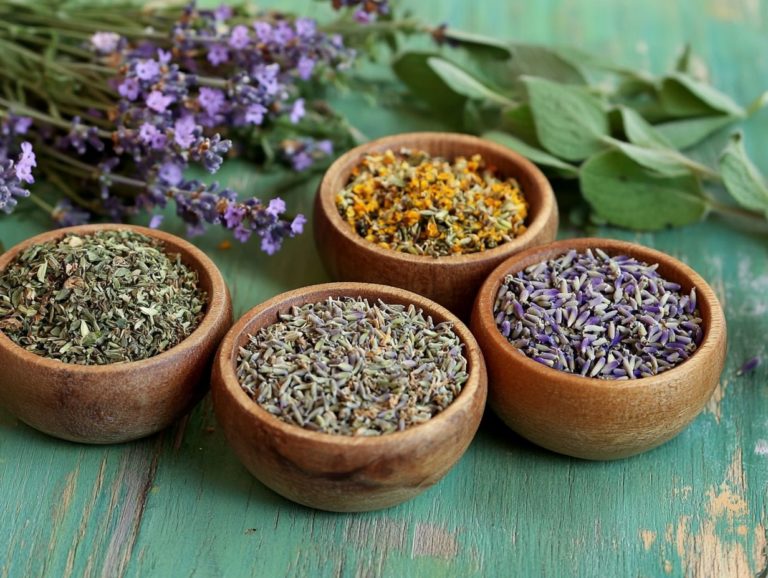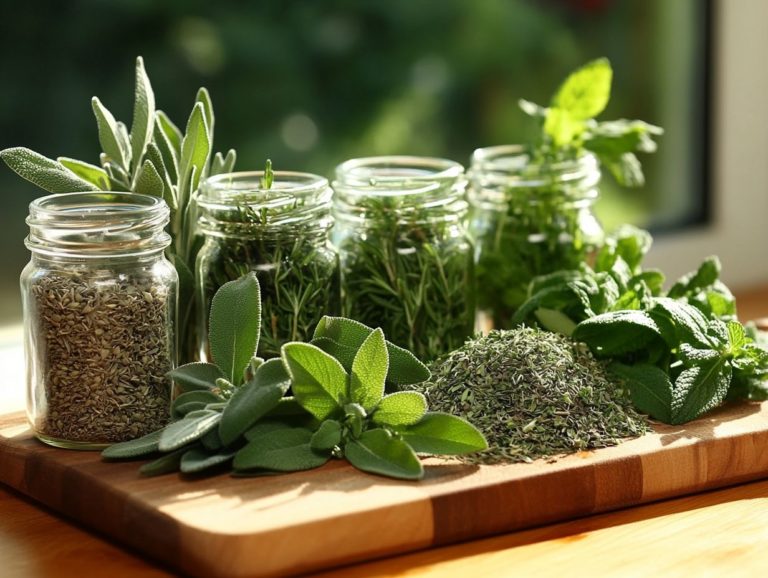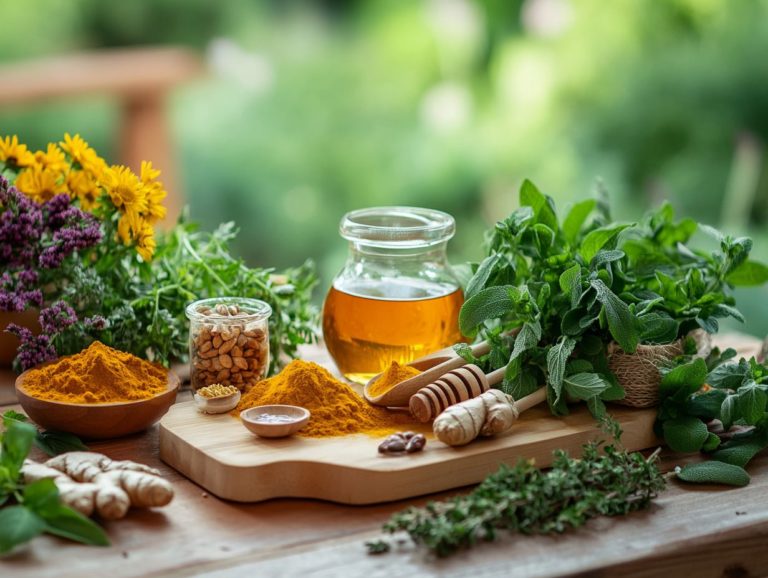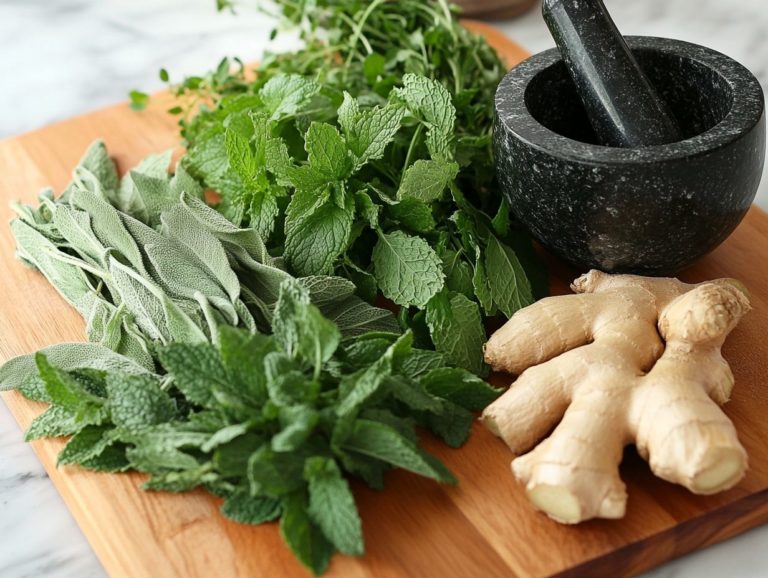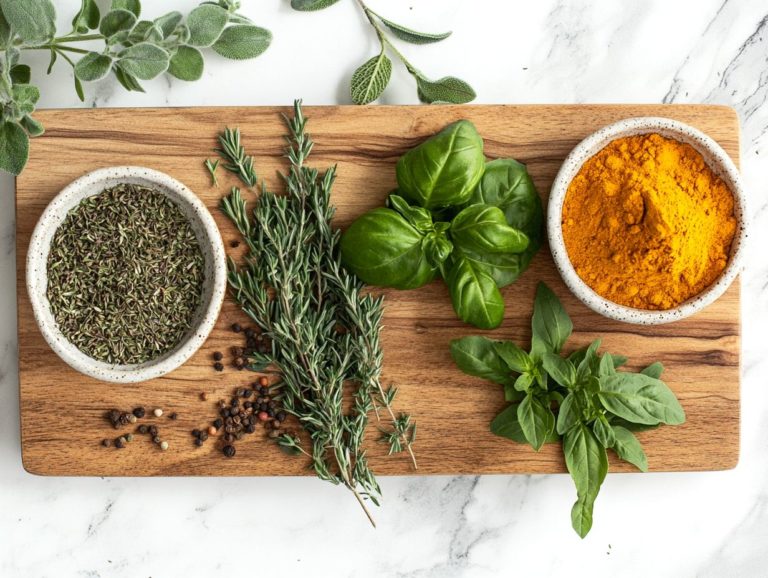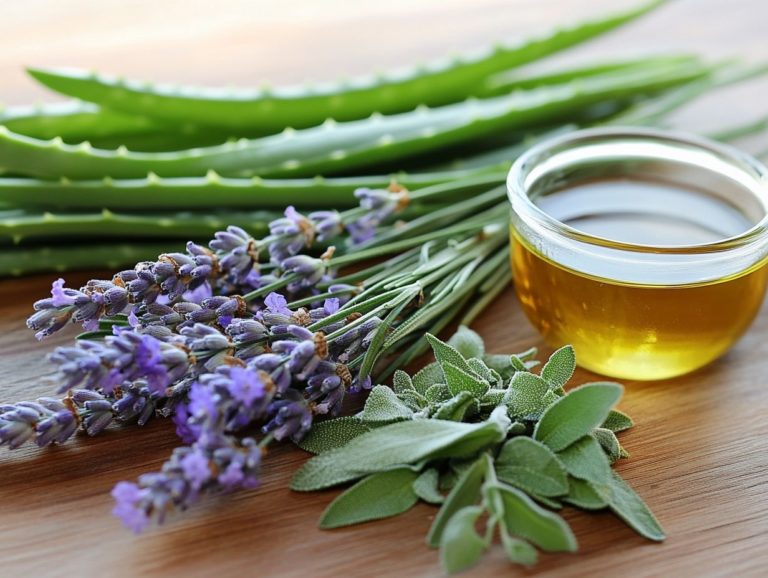Herbal Approaches to Treating Acne
Acne can be an unwelcome companion, influencing not only the appearance of your skin but also your overall confidence.
As you explore the topic of acne, you ll discover its many causes and types. Get ready to discover a variety of herbal remedies and topical applications that highlight natural ingredients known to help with acne.
Learn how to seamlessly incorporate these potent herbs into your skin care routine, paving the way for clearer, healthier skin.
Contents
- Key Takeaways:
- Understanding Acne
- Herbal Remedies for Acne
- Herbal Supplements for Acne
- Topical Herbal Treatments for Acne
- Incorporating Herbs into Skincare Routine
- Frequently Asked Questions
- What are herbal approaches to treating acne?
- What are the benefits of using herbal approaches for acne?
- Which herbal remedies are commonly used for treating acne?
- Can herbal approaches be used with conventional acne treatments?
- How long does it take to see results from herbal approaches for acne?
- Are there any side effects of using herbal approaches for acne?
Key Takeaways:
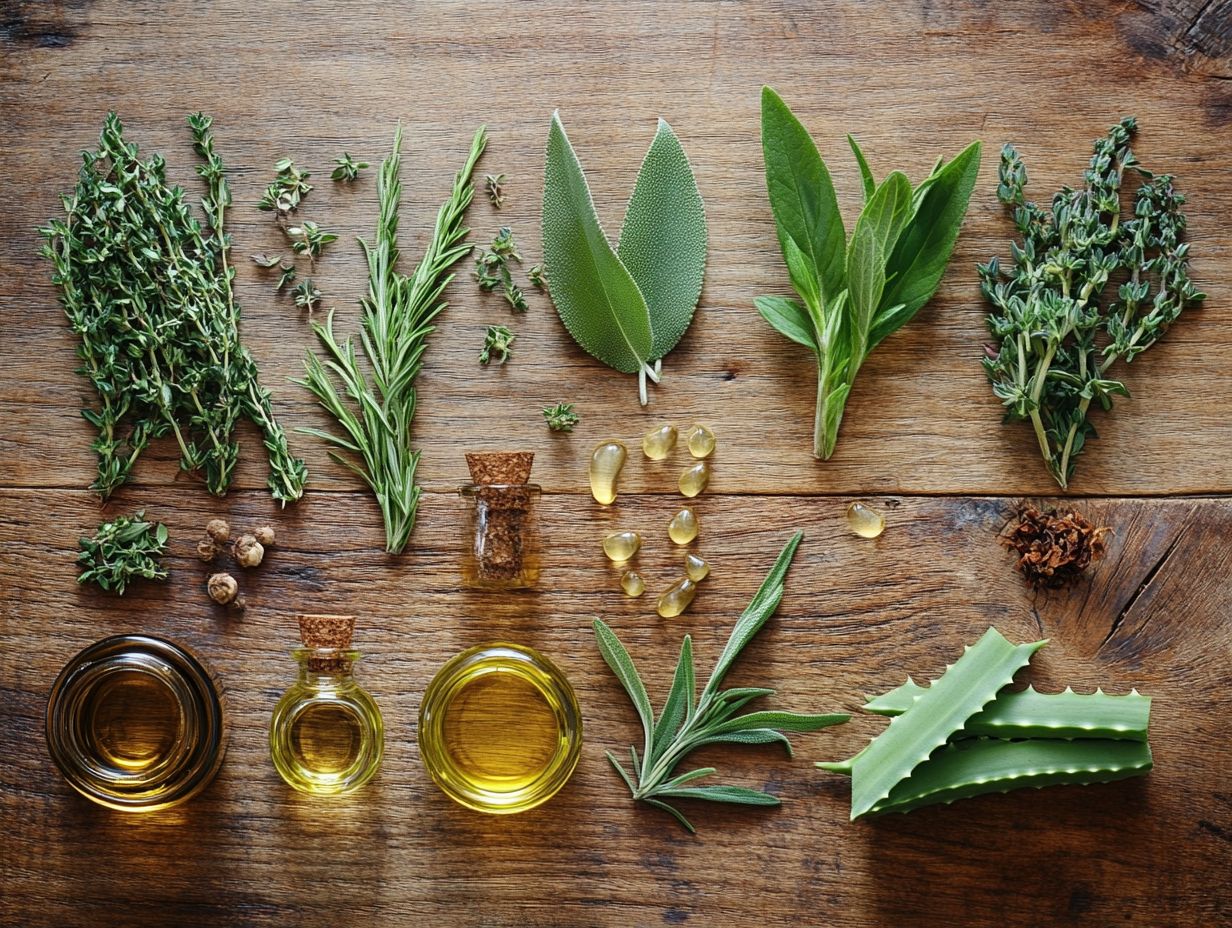
- Natural herbs can be a safe and effective alternative to treat acne.
- Herbs like tea tree oil, Aloe Vera, and Neem can reduce swelling and fight bacteria, helping to lessen acne.
- You can include herbal supplements and topical treatments in your skincare routine to improve overall skin health and reduce acne breakouts.
Understanding Acne
Understanding acne is essential for effectively addressing this widespread skin condition that affects millions around the world, especially acne vulgaris. This type of acne presents itself through various symptoms, including lesions, scarring, and inflammation.
It arises from a combination of factors, such as clogged pores, hormonal fluctuations, and excessive oil production. This results in varying degrees of severity among individuals. By recognizing the underlying causes of acne, you empower yourself to explore effective management and treatment options.
Causes and Types of Acne
Acne arises from a variety of factors, including hormonal changes that increase oil production. This leads to clogged pores and the unwelcome growth of a type of bacteria that can cause acne, ultimately resulting in different forms of acne.
Among these, cystic acne stands out as particularly severe, often appearing as painful, deep nodules beneath the skin. Hormonal acne typically surfaces around the jawline and is closely related to hormonal fluctuations, especially during menstruation or adolescence.
Beyond genetic predisposition, your lifestyle choices, such as diet, can significantly influence these conditions. By embracing anti-inflammatory foods and reducing sugar, you might notice improvements.
For a more comprehensive approach, consider hormonal treatments like oral contraceptives or antibiotics. These options can effectively reduce oil overproduction and curb bacterial growth, helping you manage skin irritation and work towards clearer skin. Additionally, incorporating essential herbs for skin health can further enhance your skincare routine.
Herbal Remedies for Acne
Herbal remedies for acne have become increasingly popular as natural alternatives to traditional treatments. You ll find a range of effective natural ingredients such as tea tree oil, Aloe Vera, and Neem, all of which have remarkable anti-inflammatory and antibacterial properties, making them particularly well-suited for anyone with acne-prone skin.
Natural Ingredients and Their Benefits
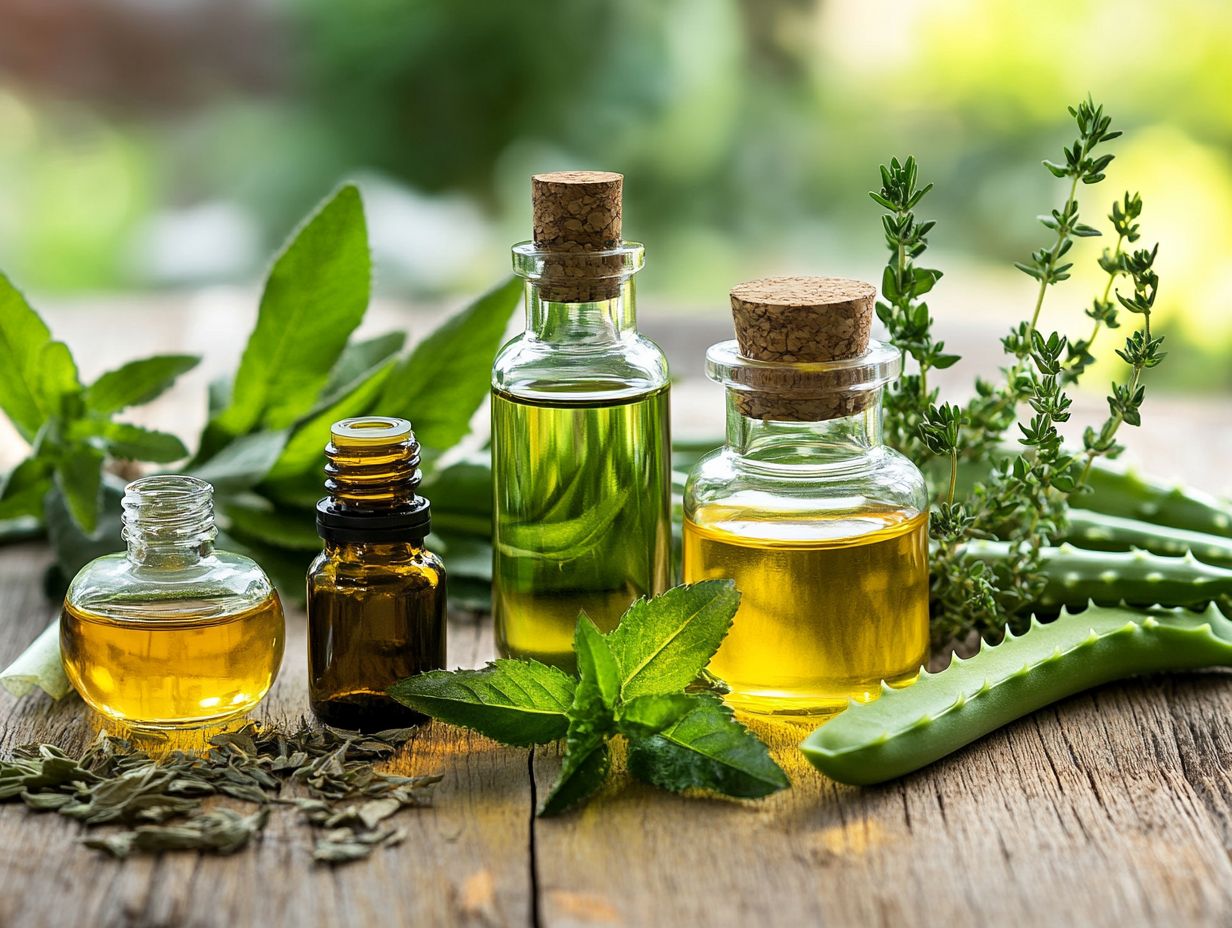
Natural ingredients like tea tree oil, turmeric, and green tea are highly regarded for their acne-fighting abilities, thanks to their impressive ability to reduce swelling and fight bacteria. These staples in herbal medicine can truly elevate your skincare game.
Take tea tree oil, for instance. Its reputation for battling bacteria is well-deserved, as studies have shown that applying it topically can lead to a significant reduction in acne lesions. Then there’s turmeric, known for its powerful active component, curcumin. Not only does it ease inflammation, but it also works wonders for your skin tone, making it a fantastic ally in fading acne scars. Additionally, consider incorporating herbal teas for better skin health into your routine for added benefits.
And let’s not overlook green tea; its rich antioxidant content helps regulate sebum production, reducing the likelihood of pesky acne lesions. For those interested in exploring further, you can check out herbal remedies for skin conditions.
Anecdotal evidence supports these benefits, with countless individuals reporting noticeable improvements in their skin health after adding these natural ingredients to their routines. For those interested in exploring natural remedies further, DIY herbal treatments for skin irritations can be an excellent addition. Together, these elements create a holistic approach to acne prevention and treatment that can transform your skincare experience.
Herbal Supplements for Acne
Herbal supplements present an excellent opportunity for anyone looking to elevate their acne treatment routine. Ingredients such as Echinacea, Zinc, and probiotics are renowned for their capacity to promote skin health and reduce acne symptoms through thoughtful dietary adjustments.
Effective Supplements for Acne Treatment
Effective supplements for acne treatment include herbal options like zinc and probiotics, both shown to promote skin health and diminish acne breakouts by targeting inflammation and enhancing gut health.
Zinc, for instance, works wonders by regulating oil production while showcasing anti-inflammatory properties. A typical recommended dosage hovers between 30 to 60 mg daily. Probiotics play their part by balancing gut flora (the bacteria in your digestive system), which can significantly impact your skin health. A daily intake of 1-10 billion CFUs (Colony Forming Units) is often recommended.
Stay aware of potential side effects, such as gastrointestinal discomfort or allergic reactions. It is wise to consult a healthcare professional before introducing any new supplement into your regimen. They can offer personalized advice and help you navigate possible interactions with existing medications. Additionally, consider exploring herbs that help with skin irritations, ensuring a safe and effective path toward clearer skin.
Topical Herbal Treatments for Acne
Topical herbal treatments for acne are emerging as a highly effective component of acne care, leveraging powerful ingredients like tea tree oil, Aloe Vera, and witch hazel.
These natural remedies not only target acne lesions but also provide soothing relief for irritated skin, making them a compelling choice for anyone looking to enhance their skincare routine.
DIY Recipes and Application Techniques
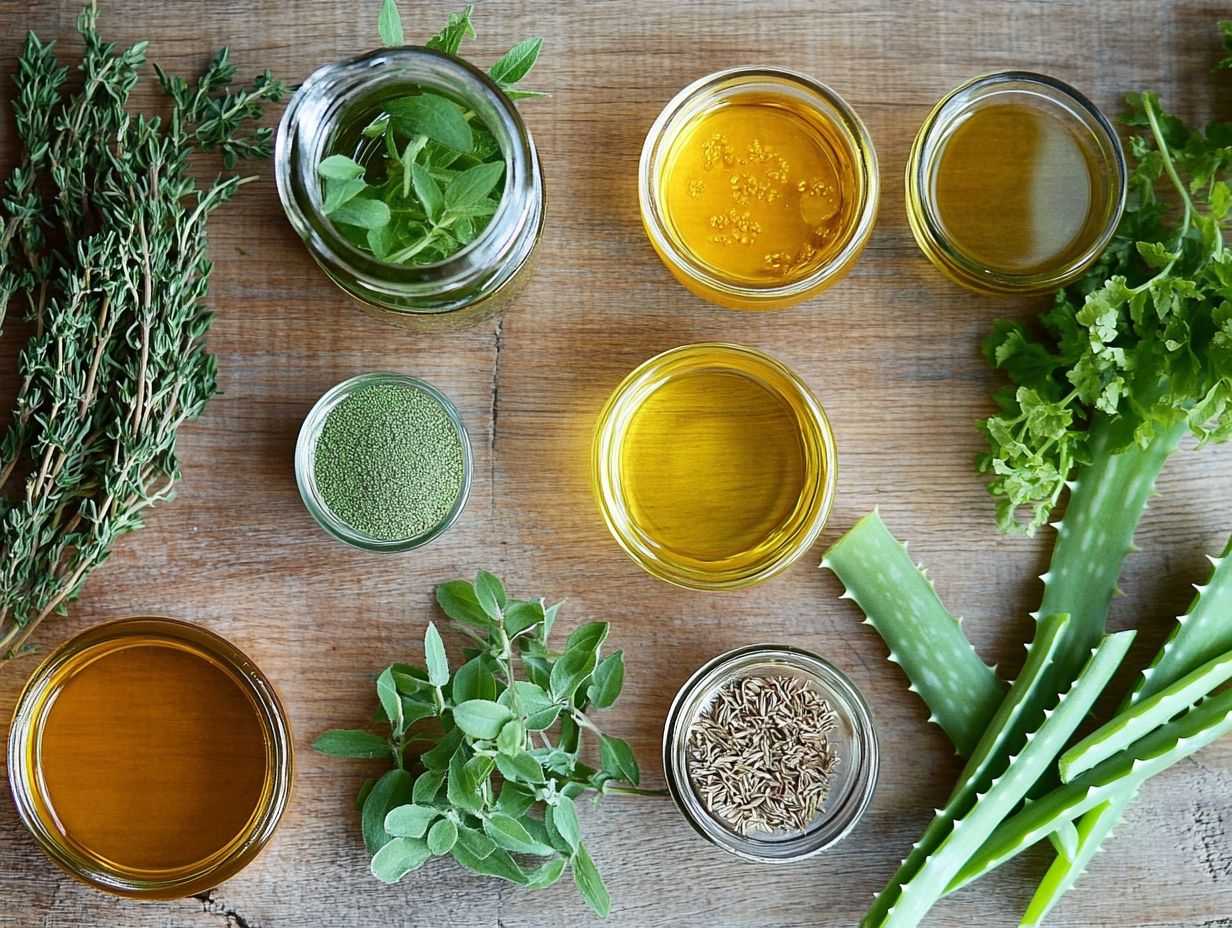
Creating DIY recipes for topical herbal treatments offers you a personalized approach to acne care, utilizing natural remedies and ingredients like tea tree oil and turmeric to effectively target acne lesions while minimizing skin irritation.
By crafting these treatments at home, you can harness the potency of nature’s offerings, ensuring transparency in what you apply to your skin. For instance, the anti-inflammatory properties of neem oil combined with honey can yield a powerful mask perfect for soothing pesky flare-ups. Additionally, learn how to create herbal skin treatments at home by simply mixing aloe vera gel with a few drops of lavender oil for hydration while combating acne-causing bacteria.
However, it’s essential to conduct patch tests before full application to avoid any adverse reactions or allergies. This careful consideration promotes your skin health and encourages a more informed skincare routine, especially when exploring herbal treatments for wound care.
Incorporating Herbs into Skincare Routine
Incorporating herbs into your skincare routine can dramatically elevate your acne management game. By embracing organic skincare products infused with herbal remedies, you promote healthier skin and foster lifestyle changes that reduce inflammation and enhance your overall skin health.
Tips for Using Herbs in Skincare
Using herbs in your skincare routine requires thoughtful consideration to truly harness their benefits for acne care. Master proper application techniques, understand the properties of essential oils, and select the right natural remedies tailored to your specific skin type.
To begin, conducting a patch test is essential before fully incorporating any new herb into your regimen. This crucial step helps you identify any potential allergic reactions or irritations, particularly if you have sensitive skin. Additionally, exploring unique herbal remedies for skin care can offer beneficial options to enhance your routine.
Mixing different herbs, like tea tree and chamomile, can amplify their effects and create a harmonious blend that addresses specific concerns. For those with oily skin, herbs such as witch hazel and rosemary work wonders in regulating sebum production. Soothing options like lavender or calendula are perfect for individuals with sensitive skin. Additionally, consider exploring 5 herbal remedies for skin conditions to enhance your skincare routine.
By grasping these combinations, you can take a personalized approach, significantly enhancing the effectiveness of your natural skincare solutions and overall skin health.
Frequently Asked Questions
What are herbal approaches to treating acne?
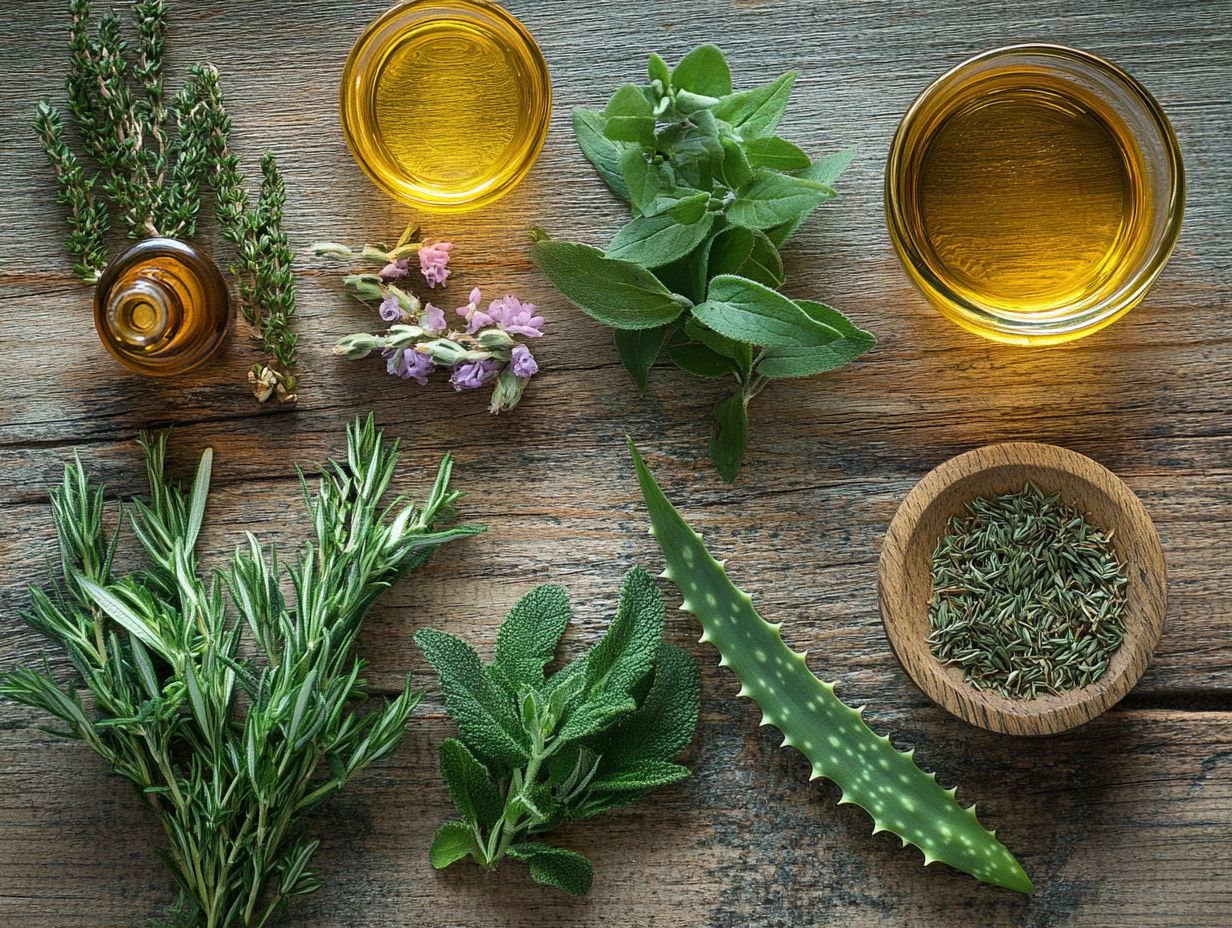
Herbal approaches to treating acne use natural remedies from plants. These remedies target issues like swelling, germs, and hormone changes.
What are the benefits of using herbal approaches for acne?
Herbal methods are gentle on the skin and often have fewer side effects. They also promote overall skin health.
Which herbal remedies are commonly used for treating acne?
Common herbal remedies include tea tree oil, aloe vera, witch hazel, green tea, and neem. These amazing treatments are known for their anti-inflammatory, antibacterial, and antioxidant powers!
Can herbal approaches be used with conventional acne treatments?
Yes, you can combine herbal approaches with conventional treatments like benzoyl peroxide and salicylic acid. Always consult a healthcare professional first to avoid any interactions.
How long does it take to see results from herbal approaches for acne?
Results can vary based on the severity of acne and skin type. Some may see improvements within weeks, while others might take longer.
Are there any side effects of using herbal approaches for acne?
Herbal methods are generally safe with minimal side effects. However, some may experience allergic reactions or irritation, so it s wise to patch-test first.

